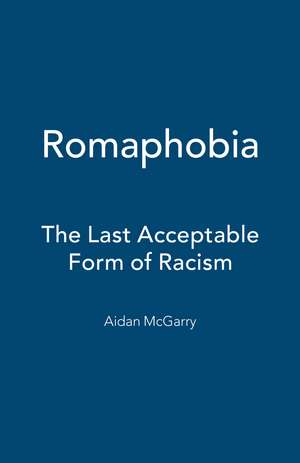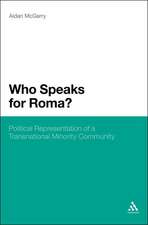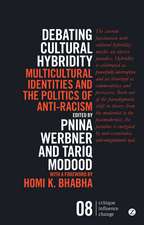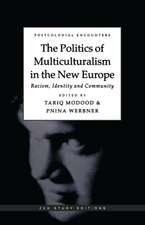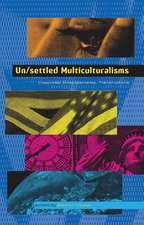Romaphobia: The Last Acceptable Form of Racism
Autor Dr Aidan McGarryen Limba Engleză Paperback – 14 feb 2017
| Toate formatele și edițiile | Preț | Express |
|---|---|---|
| Paperback (1) | 120.87 lei 43-57 zile | |
| Bloomsbury Publishing – 14 feb 2017 | 120.87 lei 43-57 zile | |
| Hardback (1) | 508.70 lei 22-36 zile | |
| Bloomsbury Publishing – 14 feb 2017 | 508.70 lei 22-36 zile |
Preț: 120.87 lei
Preț vechi: 130.70 lei
-8% Nou
Puncte Express: 181
Preț estimativ în valută:
23.13€ • 24.21$ • 19.25£
23.13€ • 24.21$ • 19.25£
Carte tipărită la comandă
Livrare economică 31 martie-14 aprilie
Preluare comenzi: 021 569.72.76
Specificații
ISBN-13: 9781783603992
ISBN-10: 1783603992
Pagini: 306
Ilustrații: Halftones, black and white 5
Dimensiuni: 135 x 216 x 25 mm
Greutate: 0.32 kg
Editura: Bloomsbury Publishing
Colecția Zed Books
Locul publicării:London, United Kingdom
ISBN-10: 1783603992
Pagini: 306
Ilustrații: Halftones, black and white 5
Dimensiuni: 135 x 216 x 25 mm
Greutate: 0.32 kg
Editura: Bloomsbury Publishing
Colecția Zed Books
Locul publicării:London, United Kingdom
Notă biografică
Aidan McGarry is principal lecturer in politics at the University of Brighton, and the recipient of the Rising Star Award 2014, for academic excellence. He is the author of Who Speaks for Roma? (2010) and co-editor of The Politics and Discourses of Migration in Europe (2013) and The Identity Dilemma (2015). His research has been published in leading journals such as Ethnicities, Ethnic and Migration Studies, Ethnopolitics, Social Movement Studies and Critical Social Policy, among others.
Cuprins
1. Romaphobia: marginalization and stigmatization in Europe 2. Strangers within the gates: territoriality and belonging 3. Roma identities: how Romaphobia distorts Roma identity 4. An expression of Romaphobia: socio-spatial segregation in Eastern Europe 5. Opre Roma! Challenging Romaphobia through Pride protests 6. Roma citizenship in the European Union: a question of belonging Conclusion. Understanding the causes of Romaphobia: between territoriality, identity and belonging
Recenzii
A compelling depiction ... This is a fascinating and provocative framework from which to view the continuing, hateful prejudice directed at Roma.
Enlightened, sensitively written and always positive, this book makes a valuable contribution.
McGarry provides a valuable service in directing our attention to the forces that produce this kind of discrimination.
A timely analysis of how fear and loathing stultifies social progress. McGarry offers an excellent examination of the mechanisms of this enduring and despicable form of racism.
A beautifully written text that is both inspiring and daunting; it does not shade or minimise the numerous challenges that are facing Romani communities in Europe, but it also offers signs of agency, empowerment and hope. This book is destined to become a benchmark for a new generation of critical scholars.
McGarry skillfully explains the complex phenomenon and history of Romaphobia in contemporary Europe. He offers a thoughtful and accessible inquiry into this persistent form of racism, and a powerful critique of how it continues to be tolerated in present-day Europe.
Draws on original research to examine enduring racism against Roma communities in Europe. Essential reading for all concerned about racism and the rise of far right politics that we are witnessing across Europe today.
McGarrys contributes to our understanding of the root causes of inequality between Roma and non-Roma. He shows that Roma exclusion is rooted in the nation-building process in Europe and the way national identities have been constructed in relation to territory.
An eloquent account of one of the most troubling forms of racism still haunting the world: Romaphobia. This book examines the root causes, as well as the experiences of Roma communities in the UK and in continental Europe.
The strength of McGarry's book lies in the exploration of a broader, transnational research agenda that seeks to awake Romani studies from its "splendid isolation", leaving one with the desire to learn more about the roots of Romaphobia.
McGarry provides the first extensive scholarly exploration of Romaphobia and vividly outlines the magnitude of the challenge to overcome stereotypes deeply embedded in European culture. Romaphobia also addresses the relatively recent innovation of Roma people and organisations actively participating in public debates about themselves.
Enlightened, sensitively written and always positive, this book makes a valuable contribution.
McGarry provides a valuable service in directing our attention to the forces that produce this kind of discrimination.
A timely analysis of how fear and loathing stultifies social progress. McGarry offers an excellent examination of the mechanisms of this enduring and despicable form of racism.
A beautifully written text that is both inspiring and daunting; it does not shade or minimise the numerous challenges that are facing Romani communities in Europe, but it also offers signs of agency, empowerment and hope. This book is destined to become a benchmark for a new generation of critical scholars.
McGarry skillfully explains the complex phenomenon and history of Romaphobia in contemporary Europe. He offers a thoughtful and accessible inquiry into this persistent form of racism, and a powerful critique of how it continues to be tolerated in present-day Europe.
Draws on original research to examine enduring racism against Roma communities in Europe. Essential reading for all concerned about racism and the rise of far right politics that we are witnessing across Europe today.
McGarrys contributes to our understanding of the root causes of inequality between Roma and non-Roma. He shows that Roma exclusion is rooted in the nation-building process in Europe and the way national identities have been constructed in relation to territory.
An eloquent account of one of the most troubling forms of racism still haunting the world: Romaphobia. This book examines the root causes, as well as the experiences of Roma communities in the UK and in continental Europe.
The strength of McGarry's book lies in the exploration of a broader, transnational research agenda that seeks to awake Romani studies from its "splendid isolation", leaving one with the desire to learn more about the roots of Romaphobia.
McGarry provides the first extensive scholarly exploration of Romaphobia and vividly outlines the magnitude of the challenge to overcome stereotypes deeply embedded in European culture. Romaphobia also addresses the relatively recent innovation of Roma people and organisations actively participating in public debates about themselves.
